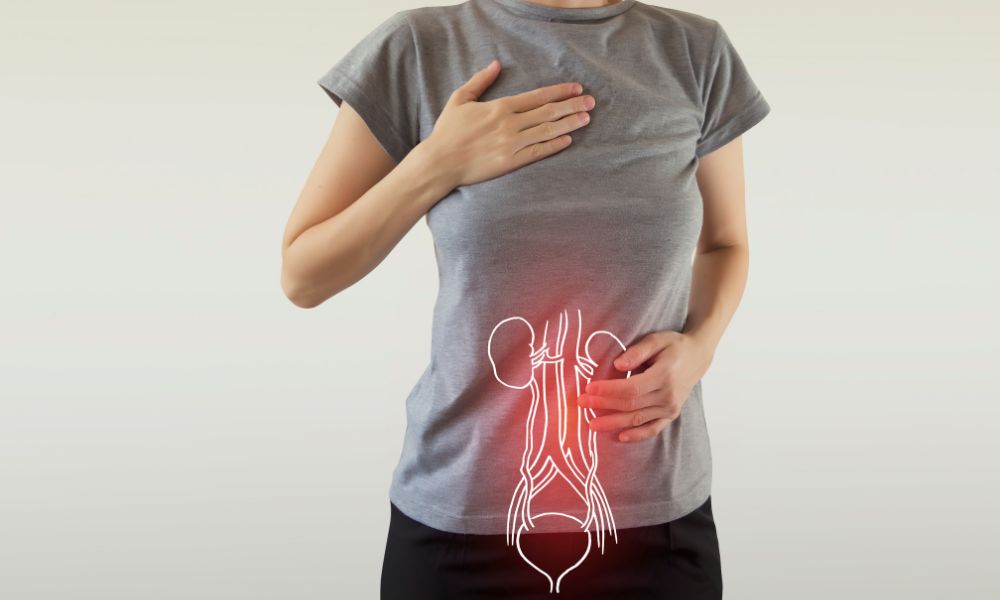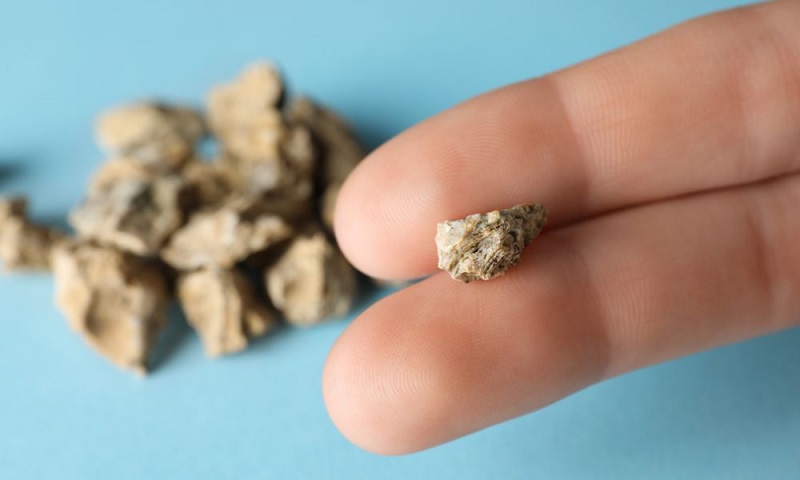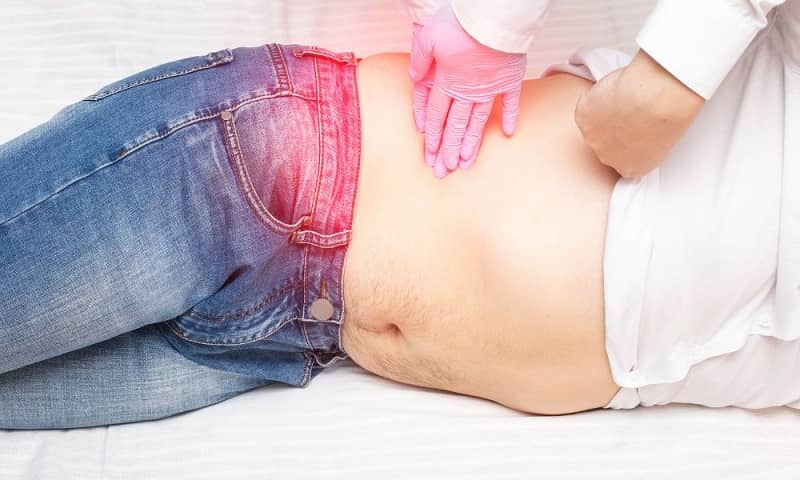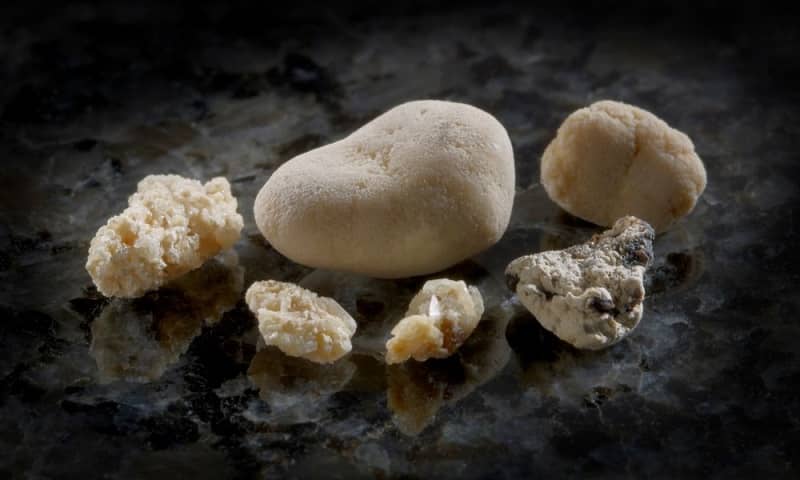
08 Nov Signs You Might Notice When Kidney Stones Pass on Their Own
Kidney stones are characterized by the deposition of crystals in the kidney, and it affects almost 12% of the entire world population.
There can be different types of kidney stones, depending on their composition, size, and site.
Generally, the initial phase of all these kidney stones remains symptomless, but as they grow in size, they later show signs like:
- Cramping pain
- Infections
- Blockage in the urine
- Dilation of kidneys flank pain, among other symptoms
In short, kidney stones, irrespective of their size and composition, remain painful in daily life.
Unfortunately, there are many myths around the passing of kidney stones. There are even home remedies people try. Luckily, research highlights the dissolving and regrowing attribute of kidney stones.
So, can kidney stones dissolve on their own and pass on through urine? Let’s find out!
Do Kidney Stones Pass on Their Own?
Their Dissolving Nature – Myth Or Fact?

According to healthcare professionals and doctors, kidney stones can be of varying sizes.
Small kidney stones are the ones that have a diameter lesser than 5 millimeters. On the other hand, big kidney stones are more than 10 mm in diameter.
Usually, the smaller kidney stones tend to pass on through the urine in the first two weeks without any treatment. According to research, this is possible because of the tendency of a kidney stone to dissolve and regrow.
Study on the Dissolving Nature of Kidney Stones
Sivaguru, along with his colleagues, used the latest techniques to peep through every thin section of a kidney stone.
One such technique lets them view the slices of the kidney stone at a high resolution of 140 nanometers.
According to the analysis through the technique, kidney stones are made of organic matter and mineral-rich layers. The study revealed that the different layers present in the stone showed some of these layers had degraded and new crystals had formed.
This formed the basis of the fact that kidney stones undergo a cycle where they dissolve on their own and then regrow within the kidney.
Hence, if we had to answer “do kidney stones dissolve on their own” the research draws a clear picture. This study was published in the World Journal of Urology.
But will kidney stones pass on their own depends on the size of the stone, because the stone has to be of small size to undergo all the stages of passing through the urine successfully.
Large kidney stones often fail to clear out these stages, and hence result in lodgement in the bladder waiting for surgical removal.
For better understanding, here are the stages kidney stones should pass through for reaching your toilet.
4 Stages of Passing a Kidney Stone
From the above sections, we get to know that a small kidney stone can pass on its own through urine, but the question is how do kidney stones pass on their own?
The answer lies in the 4 stages that it goes through:
#1. Stage I
The formation of kidney stones in the system is generally painless and you won’t even have a hint of such a process occurring inside your body.
But the problem starts when the kidney stones detach from their site of origin.
When these kidney stones detach your body senses a foreign presence within the kidney and immediately initiates the process required to eliminate it.
These signals cause severe spasms within the kidney ranging from 1-4 spasms in just one hour.
Hence at the end of a few such spasms, the stone finally leaves the kidney and you no longer feel any pain.
#2. Stage II
The second stage is all about the pathway that the stones take outside the kidney. It first enters the ureter, which are tubules designed for carrying urine from the kidney to the urinary bladder.
However, since the ureter is just 3-4 mm in diameter, any kidney stone that is above 5 mm in diameter gets stuck on the ureter opening.
Any size above 2 mm is going to hurt, but since small stones can easily dissolve they pass on the ureter easily.
Hence, small kidney stones easily clear off the second stage, but large ones might create trouble as they tear through the tubules.
#3. Stage III
Now the stone finally reaches the urinary bladder, where the stones cause an extreme increase in pressure.
Your brain senses it as a signal to pee every 5 minutes.
In the end, you will be responding to these pee signals as the stone gets stuck in the entrance of the urethra as you try to pass it on.
Again, the small stones would pass on without much pain but the ones bigger in diameter get stuck there only to cause discomfort for 5 to 10 minutes before going back to the bladder.
#4. Final Stage – Stage IV
The last stage is how you can push and push to finally let the stone pass through the urine.
As you feel the stone lodges against the opening of the urethra, you got to push until you find the stone, leaving your body.
But for identifying if the stone has passed through the urine, you must be aware of two things:
- Signs that the body shows on passing the stone, and
- appearance of the stone
The following segment goes into more detail.
First Signs of Passing a Kidney Stone

Stones usually show some characteristic signs when they pass through the various stages:
Pain
The most common sign of both the presence and passing of kidney stones is pain. Pain occurs mainly because of the obstruction it causes through the passages like the ureter and urethra. It could be a mild form of pain or intense pain that requires you to consult a doctor immediately.
Some common sites of pain during the passing of the stone include:
- Pain in the side
- Between the ribs
- Near the hip
- Lower abdomen
- Groin
Blood in Urine
Your urine might show a touch of red or pink because of little bleeding during the tearing of the passage as the stone passes through tubules.
Cloudy and Foul Smelling Urine
Since the stones are made of minerals, while passing them through your urine, both color and smell can change.
Your urine becomes dark in color and stinks as if you are suffering from UTI or dehydration.
Obstruction in Urinary Flow
Since the passing stone can obstruct the urinary passage, it creates signals that make you feel the urgency to pee.
During urination, you feel a burning sensation with pain.
Other than these physical signs of passing kidney stones, you might also look for the presence of the stones in your toilet.
Here is how you can identify if you have passed a kidney stone.
What Do Kidney Stones Look Like in the Toilet?
Kidney stones, according to the National Institute of Diabetes and Digestive and Kidney Diseases, appear as tiny pebbles that have varying colors.
They can appear anywhere from yellow to brown with a texture either smooth or jagged.
Small stones that you pass through the urine are generally of a size similar to grain.
Sometimes, if you have put too much pressure and a stone of 5-6 mm has managed to pass through, it would appear like a pea.
But passing out kidney stones is not a quick process and can take a longer time.
How Long Does It Take to Pass a Kidney Stone?
The kidney stone passes through 4 stages to finally be flushed out from your body, and hence the process is not rapid.
If we stick to what the American Urological Association says:
- A kidney stone of less than 2 mm diameter passing through the ureter can take as long as 8 days to pass on.
- Stones of diameter 2 mm to 4 mm take around 12 days to pass into the urine.
- While those in the range of 4-6 mm take 22 days to pass on.
But most kidney stones take around 44 days to pass through if the patient is in healthy condition.
This process of dissolving and passing can be stimulated with the help of the following ways.
How Can You Quickly Pass a Kidney Stone?

Since kidney stones can only pass through urine and not from anywhere else in the body. There are only a few ways that are not based on myths and are said to actually speed up the process:
#1. Drinking water – drinking water when you feel that the stone is passing can boost up the process. Increase your water intake up to 12 glasses a day during the process.
Even if the stone successfully passes continue with the same hydration schedule.
#2. Lemon – Adding lemons to your fluid can help speed up passing the stone through urine as they help in dissolving calcium stones.
#3. Basil – A few drops of basil juice in your fluid can make it easier and speedier to pass through the stones, as they help in breaking down the stones. However, there’s less research about its effects on kidney stones, so proceed with caution.
#4. Celery juice – It is known only because it flushes out all the toxins that can contribute to the regrowth of kidney stones. Also, it increases the mechanism of flushing out toxins in your body so that you can easily flush out the stones. Its effects on kidney stones were assessed in a study done on rats.
Despite these remedies, certain factors can delay the release of kidney stones through your urine.
4 Factors Affecting Passage of Kidney Stone
Certain factors affect a person’s ability to pass kidney stones. Some of these factors are:
- Prostate enlargement
- Pregnancy
- Size of the stone
- Location and composition of the stone
Prostate enlargement and pregnancy result in the narrowing of the urinary ducts making it difficult for the stone to pass through.
While if we talk about the size, large stones are generally of a diameter ranging above 10 mm, and the ureter is just 3-4mm.
Hence, they cannot pass through the urine without dissolving.
But can large kidney stones dissolve on their own? No, they require special medical care for desolvation and treatment.
Treating Large Kidney Stones

Large kidney stones cannot dissolve completely on their own and require special medical care like dissolving medications or surgical removals.
Usually, a large stone is removed when:
- The stone doesn’t pass through urine within 4 weeks
- It causes severe discomfort with chronic pain
- They are larger than 10 mm
They are removed in two ways.
#1. Medications
Medications are used to relax the urinary system muscles for easy passage of the stone through the bladder.
However, only a few medications have been approved for such usage.
Some medications are used to break down large kidney stones.
For example, doctors might recommend alkaline citrate salts and sodium bicarbonate for dissolving stones consisting of uric acids.
But even after breaking down these stones, do most kidney stones pass on their own? The answer is no, and certain stones regrow and have to be removed by other medical methods.
#2. Removing Kidney Stones
On the off chance, if the stones don’t pass out even after using the above method and regrow, the following techniques can be used:
Ultrasound shock wave therapy – sound waves break down the kidney stones which are then flushed out through urine. For this technique, a special machine that sends sound waves through the tissues to the stones is used. It takes around 30 to 60 minutes for treating kidney stones with this method. However, they are only helpful in treating stones smaller than 20 mm.
Ureterorenoscopy – small instruments are inserted into the urethra to mechanically break the stones and the pieces are removed with the help of an endoscope. This too helps break stones that are smaller than 20 mm in diameter.
Percutaneous Nephrolithotripsy – an endoscope is passed through the renal passage by making a small incision on your back. Using a laser or mechanical method the stones are broken into pieces which are then flushed into the urine. However, this method cannot break stones larger than 10 mm in diameter.
Conclusion
Although not all kidney stones pass through urine easily, or on their own, yet most of them are removed through various methods. But what to expect after passing a kidney stone remains an area of concern.
Generally, after you pass your kidney stone, it takes some time for the pain to diminish. You might also experience soreness for some time but all of this is temporary.
Unless you again fail to take preventive measures and end up having stones. This is very common among kidney stones patient as the stones tend to regrow.
Apart from pain, you might also experience constipation post passing your stone, but if you notice the following signs, consult a doctor ASAP:
- Fever
- Inability to urinate
- Fatigue and weakness
- Urine with blood clots
There’s no need to panic. Just get yourself checked and follow your doctor’s advice. The best thing is now we have painless and less invasive ways to get rid of kidney stones. So, you should get discharged and feel fine within a week.
If this blog answered your queries, do help us spread the word by sharing in your circle.
OTHER MYTH-BUSTING POSTS:
Do Tattoos Cause Cancer? – Long-Term Health Effects



No Comments